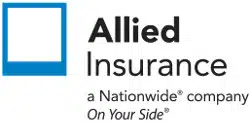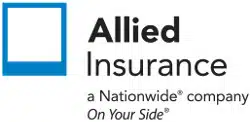Allied Insurance is a subsidiary of Nationwide Insurance that offers personal, business, and farm/ranch policies to protect your assets.
The company was founded in Iowa in 1929 but has grown quite a bit since its early days.
As of today, you can find brick-and-mortar Allied Insurance offices in Nebraska, Florida, Colorado, and California.
In 2014, Nationwide rebranded its subsidiary companies — including Allied Insurance, which had long been a Nationwide brand — into the Nationwide name.
Table of Contents
Our Allied Insurance Review
If you’re worried about quality, note that Allied Insurance has an A+ rating from the Better Business Bureau (BBB) along with an A+ rating from A.M. Best.
They also have top ratings from Standard & Poor’s and Moody’s, which is rather impressive due to the size of their firm.
When it comes to personal insurance coverage, Allied Insurance offers:
- Homeowner’s Insurance
- Auto Insurance
- Powersports Insurance
- Personal Protection, And
- Life Insurance
Most of the policies they offer are customizable, meaning you can tweak inclusions and coverage amounts until you find the exact coverage you need.
The company also offers special discounts and a rewards program that sets it apart from other life insurance providers.
Allied Insurance Auto Coverage

Auto insurance is one of the most popular types of coverage Allied Insurance offers.
While there are many typical plans to choose from, Allied also lets you customize policies so you wind up with an auto insurance policy that is perfect for your needs.
Allied auto insurance coverage can include:
- Liability Coverage: Kicks in when you are in an accident and legally liable for bodily injury or property damage
- Medical Payments: May cover medical bills for you and other passengers in your car if they are injured.
- Uninsured/Underinsured Motorist Coverage: Covers bodily injuries if you or passengers in your car are injured in an accident involving an uninsured or underinsured driver.
- Personal Injury Protection: Can reimburse you or a car passenger in the event you are injured or experience death, loss of services, or loss of income.
- Comprehensive Coverage: Will pay to repair your auto (as well as other covered expenses) if your car is damaged in a covered event.
- Collision Coverage: Will repair your car if you’re in an accident with another object.
Allied offers a wide range of discounts to make their auto insurance policies more affordable, including multi-policy discounts, new vehicle discounts, good student discounts, easy pay discounts, and Farm Bureau customer discounts in certain states.
Allied also offers a rewards program for their auto insurance policies, although it may work differently than you think.
Rewards you can choose from within this program include accident forgiveness, good-as-new coverage, roadside assistance, and savings on your deductible.
Allied Homeowners and Property Insurance
As I mentioned earlier, Allied Insurance also offers an array of insurance products to protect your primary residence, second home, rental property, or condominium.
Allied is one of the best homeowners insurance companies, offering flexible home insurance coverage you can tailor to meet your needs.
The main purpose of Allied homeowner’s insurance coverage is to protect your property from:
- Fire and Lightning
- Windstorms and Hail
- Smoke Damage
- Freezing Damage
- Theft
In addition to basic homeowners and property insurance coverage, Allied Insurance also offers consumers help with buying flood insurance as well as adequate liability coverage.
Liability coverage is important because it protects consumers against:
- Claims for Injury to Others on or off Your Property
- Claims of Property Damage
- Liability Defense Costs in the Event You Are Sued
- Medical Expenses for Injuries to Others
Allied Insurance also offers important extras that will protect the components of your home that you may not consider when assessing its value.
Extra coverage can take care of:
- Living Expenses You Incur if Your Home Becomes Uninhabitable
- Debris Removal
- Repairs That Can Protect Your Property From Damage After a Loss
- Replacement Trees, Shrubs, Plants or Lawn
- Fire Department Service Charges
- Coverage for a Second Home or Rental Unit
Allied Insurance Life Insurance Coverage
In addition to everything else, Allied Insurance offers several different life insurance products that can protect your family in the event of your death.
A life insurance policy is important if you hope to leave your family with assets to pay for living expenses, college tuition, or retirement once you and your income are gone.
Allied life insurance policies are backed by the strength and stability of Nationwide Insurance.
The company offers term life, whole life, universal life, and variable universal life insurance products that can be tailored to meet your needs.
However, they note that term life insurance is the most popular with consumers.
Not only can you purchase a term life insurance policy that is affordable, but these policies provide a death benefit for up to thirty years.
Allied Business Insurance
Allied also offers several different policies that cater to businesses.
While it’s possible to get coverage for a wide range of entrepreneurial pursuits, the main types of business they cover include:
- Auto Service and Repair
- Contractors
- Golf Course
- Office
- Retail
- Senior Living
- Services
- Wholesale/Distributor
While Allied offers personalized business insurance policies, they do offer several main forms of coverage.
These types of coverage include loss control, bonds, commercial auto, commercial property, general liability, and umbrella coverage.
The Bottom Line
If you’re searching for insurance coverage for yourself, your home, or your business, Allied Insurance is one option to explore.
This company is a subsidiary of Nationwide Insurance, which is well known for the safety and security of its products.
Allied also offers customizable insurance coverage and insurance agents who will help create a policy that offers coverage for what you value most.
Also, note that Allied offers a helpful website with plenty of functionality and helpful tools. You can log into their website to pay your bill, view your policy, or track a claim quickly and easily.
They also offer 24/7 customer service and a popular mobile app.
Since Allied Insurance offers a wide range of discounts, particularly if you bundle more than one type of insurance coverage together, their policies can also be extremely affordable.
However, since insurance rates can vary widely based on where you live, how much coverage you want, and other factors, you should shop around with Allied Insurance and its competitors to compare premiums, coverage levels, and included benefits.
How We Review Insurance Companies
Good Financial Cents systematically reviews U.S. insurance companies, emphasizing policy offerings, customer experiences, and overall reliability.
Our goal is to present a balanced and comprehensive perspective to potential policyholders. Editorial transparency remains a cornerstone of our approach.
We actively collect information from insurance companies and place significant weight on customer feedback. By integrating this feedback with our research, we can offer a well-rounded evaluation.
Each company is then rated based on multiple criteria, resulting in a star rating from one to five.
For a deeper understanding of the criteria we use to rate insurance companies and our evaluation approach, please refer to our editorial guidelines and full disclaimer.
Allied Insurance Review

Product Name: Allied Insurance
Product Description: Allied Insurance, a subsidiary of Nationwide, offers a range of insurance products, including auto, home, and business insurance. They aim to provide personalized coverage options to meet the needs of their customers.
Summary of Allied Insurance
Allied Insurance is a well-established insurance provider that operates under the Nationwide umbrella. They offer a variety of insurance products, with a focus on auto and home insurance. What sets Allied Insurance apart is their commitment to personalized coverage solutions. They work closely with customers to understand their unique needs and tailor policies accordingly.
-
Cost and Fees
-
Customer Service
-
User Experience
-
Product Offerings
Overall
Pros
- Personalized Coverage Options
- Backed by Nationwide
- Strong Financial Stability
Cons
- Limited State Availability
- Mixed Customer Reviews
- Limited Coverage Options








You don’t want this company. They have called me over 50 times in the last week and they will not stop upon request. They harass and continue to harass. Block them if you can.